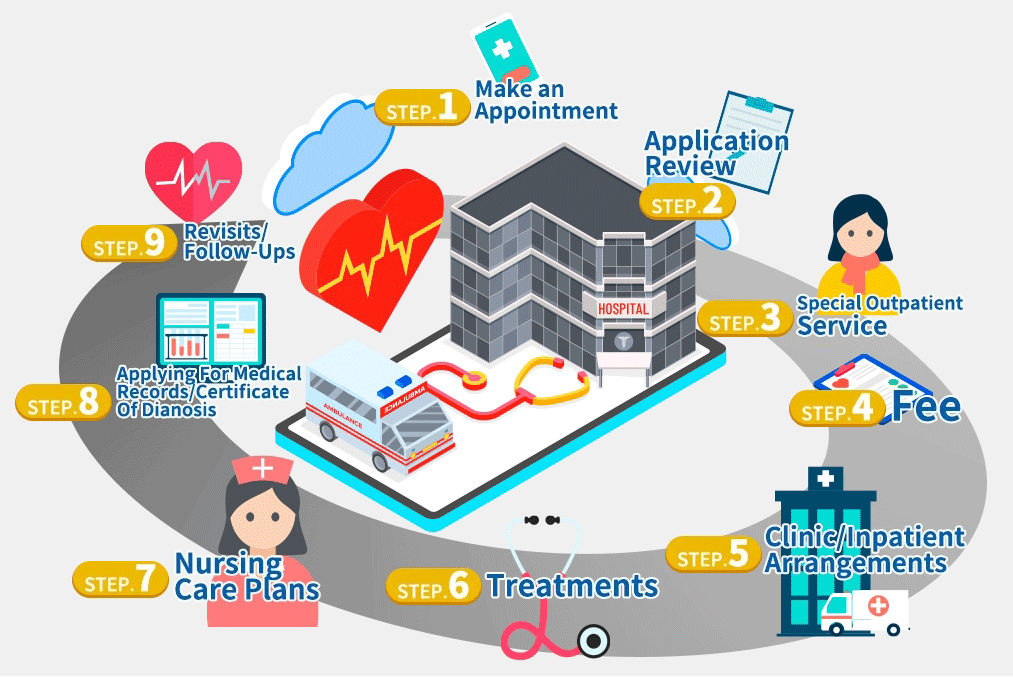
Kidney transplantation
- Recipients
Qualification
Kidney transplantation criteria
1.The uremia patients who are under dialysis treatments and qualified to be catastrophic illness patients (exception: living-donor transplant)
2.Excepting the kidney diseases that the patients have carried, the patients do not have other severe illness, such as cancer and active infection.
3.The patients want to have kidney transplants at their own free wills, and can fully understand the rate of successes, dangers and complications.
4.The bladders and urinary tracts of the patients perform their normal functions. If not, the patients need to have corresponding treatments.
The lives of most end stage liver failure (uremia) patients count on dialysis. They are suitable for liver transplant unless the patient has other contraindications, such as malignant tumor, whole body infection, severe cardiovascular diseases, unstable coagulation, chronic respiratory failure, cardiac failure, mental illness, severe congenital malformations of urinary system and aids.
Clinic/inpatient arrangement
The assessments before kidney transplant is very important. The main purpose is to reduce the complications after the surgery. We will arrange you to have the following examinations:
1.Blood test:
Blood type, functions of liver and kidney, anti-HAV, anti-HBV, anti-HCV, the virus quantity of hepatitis BC, antibody of syphilis, AIDS, tumor index, blood counting, hemostasis, thyroid function, tuberculosis, tissue matching and autoimmune system
2.Image check:
Chest x ray and abdominal ultrasound
Breast ultrasound and mammography for female patients
3.Others: Electrocardiography and urinalysis and urine cytology
If patients are also elders or having diabetes, they need to take further cardiac examinations, such as cardiac ultrasound or systolic function. Elder women need to take breast and cervix examinations. Elder men need to take prostate examinations and bladder function examinations if having difficulty of urination. Oral health is also important. If you have cavities, you need to take treatment immediately. Otherwise, they may become the cause of transplant infection.
Treatments
The surgery will be performed in the lower quadrant of the abdomen. The doctor will make an incision that looks like new moon. Then, the doctor will place the kidney at the pelvic fossa, and match the arteries and veins of the kidney and proximal ureter. The kidney may be from a decease donor, the spouse of the recipient, or the donor who is related by blood to the recipient. Whether removing the original kidney or the unsuccessful transplanted kidney is depending on different situations.
Nursing care plans
1.If there are not any rejections or complications, the patient may be discharged 10~14 days after the surgery.
2.Long-term medications is necessary after the surgery (including anti-rejection medicines and other medicines in need). Each medicine has certain side effects, and the patients’ underlying medical conditions (e.g. viral hepatitis) may be worsened and should be carefully monitored.
3.Blood transfusion–kidney failure often happens with anemia. Therefore, in order to maintain cardiopulmonary function, sometimes it is necessary to have blood transfusion during the surgery. The side effect of blood transfusion is showed in the blood transfusion consent form. If you disagree with blood transfusion, please inform the medical crew in advance.
4.Acute rejection (10-20%)–most of the acute rejections can be treated by the stronger anti-rejection medicines. Only in some rare cases (<5%), the acute rejections cause the permanent transplanted kidney function failure.
5.Sometimes the transplanted kidney will not fully function after the surgery. The incidence depends on the resources of the transplanted kidney; <10% for living-donor transplants and 30% for deceased-donor transplants. Sometimes the transplanted kidney may not function at all.
6.Hematuria might happen at different levels to the patients after the surgery. In general, this symptom will be self-improved.
7.The incidence of complications after the surgery is 5%-10%. With severe complications, the patient may need to have another surgery.
Infection or slowing healing of wounds-the wounds may have some complications due to anti-rejection medicines.
Wound bleeding Urinary leakage or incontinence Hernia of the incision
Embolism of kidney artery or kidney vain-needing to have another surgery, or blood vessel aggressive treatment
Infection-such as urinary tract infection, infection of respiratory tract and biliary tract, other virus infections and severe comprehensive infections Malignant tumors or lymphoma happening, or the treated cancer relapsing The transplanted kidney not functioning。
Cardiac or vascular diseases
Diabetes happening Death (<1%)
8.The kidney diseases that the donor had carried may occur to the transplanted kidney.
9.The side effects of certain anti-rejection medicines:
( 1 ) Cyclosporine (neural) or tacrolimus (prograf): tremor, high blood pressure, kidney function declining, constipation, diarrhea, headache, abdominal pain, sleep disorder, hypophosphatemia, hypomagnesaemia, gum thickening, hair growing, baldness, hyperkalemia and diabetes
( 2 ) Prednisolon: appetite increasing, body weight gaining, appearance changing (moon face and buffalo hump), body fluid detaining, high blood pressure, sugar tolerance decreasing, bone density decreasing (more risky having fractures), digestive disorder, cataract, glaucoma, skin thinner, easy having bruises
( 3 ) Mycophenolate mofetil (Cellcept )or Mycophenolic Acid (Myfortic): leukocyte and platelets decreasing at different levels, nausea, vomiting, diarrhea, fever throat pain, tiredness, muscle pain, tuberculosis, hepatotoxic, pancreatitis
( 4 ) Sirolimus (rapamune) and everolimus (certican): leukocyte and platelets decreasing at different levels, canker sores, diarrhea, edema or pain in lower limbs, rash and hepatotoxic
( 5 ) Basiliximab (Simulect) and antibody interleukin: the side effects are not common. Sometimes, the liver index elevates at a slight level. The symptoms will be improved after reducing the medicine dose.
Revisits/follow-ups
After discharged from hospital, you need to visit your doctor to follow up your condition once a week in the beginning. After stabilizing, you may visit the doctor once every 2 weeks or a month. During the visits, you will need to take blood tests to measure the liver function and the drug level of the anti-rejection medication. You may also need image study (ultrasound) every 3~6 months.
最後更新: